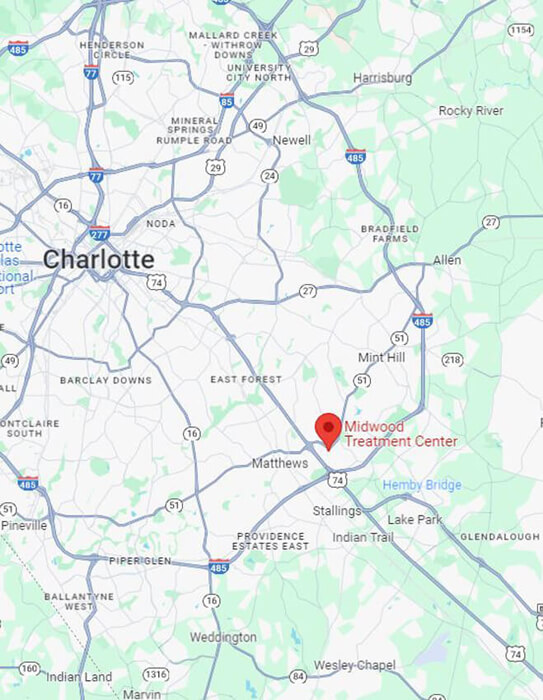Dual diagnosis is a complex mental health and substance use disorder that requires specialized treatment to reduce relapse potential. The licensed mental health professionals at Midwood Addiction Treatment Center have the training and experience needed to address your needs. Call us today to learn about your dual diagnosis rehab financial considerations.
What Is Dual Diagnosis Disorder?
Dual diagnosis disorder is not a medical diagnosis but rather a description of when someone has both a mental health condition and an alcohol or drug use disorder at the same time. Dual diagnosis disorders can affect people from all walks of life and all age groups. The link between mental health conditions and substance use disorders is complex.
Substance abuse can change the chemical balance in the brain and trigger a mental health condition or make an existing one worse. Sometimes, mental illness occurs first, and at other times, a substance use disorder and mental health condition occur at the same time. The terms dual diagnosis and co-occurring disorder are sometimes used interchangeably. It is important to note that there can be more than one co-occurring mental health condition alongside a single or multiple substance use disorder. In other words, a person may have depression and post-traumatic stress disorder (PTSD) along with an addiction to alcohol and drugs.

Midwood Addiction Treatment Center
Contact us to schedule a free assessment.
How Much Does Dual Diagnosis Treatment Cost Without Insurance?
Dual diagnosis treatment cost varies considerably, primarily based on the intensity of treatment required to address your co-occurring mental health disorders and substance abuse. Mental health and substance use treatment costs are dependent on the need for medication-managed detoxification and integrated mental health and addiction care.
The second factor is the financial help you may find to cover your dual diagnosis out-of-pocket costs for a mental health intensive outpatient program or a partial hospitalization program. The best way to estimate your costs for dual diagnosis care expenses is to call Midwood Drug and Alcohol Addiction Treatment Center at (888) 399-7556. Our admission counselors can verify insurance coverage, estimate your costs, and connect you with our financial counselors who are adept at guiding you through your payment options.

Dual Diagnosis Center in North Carolina That Offers Payment Plans
Midwood Alcohol and Drug Addiction Treatment Center is a dual diagnosis treatment center that offers payment plans to help you manage your finances during co-occurring disorder rehab. Integrated treatment includes dual condition interventions to help you heal. Call us today for more information about how we can arrange a plan that fits your needs.
Midwood Addiction Treatment Center
3057 Senna Drive
Matthews, NC 28105
Phone: 888-399-7556
Website: Midwood Drug and Alcohol Addiction Treatment Center
Common Types of Dual Diagnosis Treatment
Several combinations of substance use disorders and mental health conditions fall under a dual diagnosis. The following are common types of combinations but are not a full list. You don’t need to identify your specific mental health condition or substance use disorder to seek treatment with Midwood Substance Addiction Treatment Center.
Our licensed mental health professionals are adept at identifying symptoms and common risk factors that may contribute to your challenges. While it can feel overwhelming, there is hope and dual diagnosis treatment plans that utilize a whole-person approach and combined mental health and substance use treatment to increase your rate of success and reduce your potential for relapse.
Depression and Alcohol Use Disorder
Alcohol use can factor into the expression and severity of depression. There seems to be a bidirectional relationship between the two disorders, and each disorder seems to worsen the other.
The pathways that lead to the development of depression and a co-occurring alcohol use disorder are complex, and when these conditions occur together, it tends to increase the severity and affect the prognosis than if either disorder occurs alone.
Bipolar Disorder and Substance Abuse
Substance use disorders are prevalent in people with bipolar disorder, which significantly affects clinical outcomes. Substance use can happen during a person’s manic or depressive state, but the drug of choice may be different based on the mood and the intention for self-medication.
For example, during a manic phase, a person may use a stimulant to prolong the high energy or a depressant drug to help calm down. Frequent drug use can also cause physical changes in the brain that can affect your mood and behavior.
Anxiety Disorders and Substance Use
Decades of research have demonstrated that anxiety disorders and substance use disorders co-occur at greater rates than could be expected by chance. It may be tempting to grab a glass of wine to calm your nerves, but over a long time, it can increase your risk of alcohol-induced anxiety.
Over time, you can build a tolerance to alcohol, which makes coping with anxiety even more difficult. When you stop drinking, it can also contribute to the symptoms of alcohol withdrawal.
Post-Traumatic Stress Disorder (PTSD) and Substance Abuse
Post-traumatic stress disorder (PTSD) is an anxiety disorder caused by witnessing or being involved in a traumatic event. Substance use disorder and addiction are commonly associated, which is sometimes triggered by people who try to self-medicate, and the substance of choice is typically alcohol and no other types of drugs. This sometimes leads to binge drinking.
Borderline Personality Disorder (BPD) and Substance Use
Personality disorders often create a distorted and rigid way of thinking, behaving, and feeling, producing atypical behaviors and emotional dysregulation. This is often disruptive to life and relationships. A person’s desire to control these unstable emotional reactions may lead to a substance use disorder. While borderline personality disorder doesn’t cause a substance use disorder, it can increase the risk.
Attention-Deficit/Hyperactivity Disorder (ADHD) and Substance Abuse
There is a complicated relationship between ADHD and substance use disorders and an overlap in treatment for these co-occurring disorders. Data suggests that ADHD medication treatment does not increase the risk of substance use disorders. However, people with ADHD commonly start having problems with substance use disorder at an earlier age than people without ADHD.
Eating Disorders and Substance Abuse
According to the National Eating Disorders Collaboration, individuals with an eating disorder are five times more likely to have a substance use disorder, and those with a substance use disorder are 11 times more likely to have an eating disorder. Eating disorders primarily affect women, and most are diagnosed during adolescence.
An eating disorder affects an individual’s mental and physical health. Despite the comorbidity, individuals with these co-occurring disorders are often underdiagnosed and under-treated. Treatment is essential, and recovery is possible. Call Midwood Addiction Treatment Center in Charlotte, North Carolina, for more information about how we can help with co-occurring mental health conditions.
Personality Disorders and Substance Use
Comorbid personality disorders are often associated with substance abuse. Some experts estimate that in patients who are treated for addictions, up to 73% also have a personality disorder. These co-occurring conditions make treatment more challenging but not impossible. The conditions must be treated simultaneously to improve the potential for successful treatment and reduce potential relapse.
Is It Worth Paying for Co-Occurring Treatment?
With or without insurance, dual diagnosis treatment is well worth the cost. Integrated treatment is far less expensive than undergoing multiple treatments individually. Additionally, co-occurring disorders therapy increases the potential for successful recovery. There are also health benefits to eliminating substance use disorder, including a reduced risk of disease and injuries from high-risk behaviors associated with substance abuse.
In the long run, there are also financial benefits to mental health partial hospitalization programs and intensive outpatient programs. Substance abuse is costly, including the cost of alcohol and drugs and the effect it has on your employment. Additionally, substance use disorders can lead to theft to pay for the substance abuse. According to federal data, prisons and jails have an increased risk of overdose from drug and alcohol intoxication. The rate has increased by more than 600% in state prisons and over 200% in county jails.


Does Insurance Pay for Dual Diagnosis Treatment?
Yes, most health insurance policies cover dual diagnosis treatment costs. This was mandated in 2010 by the Affordable Care Act, which defines mental health conditions and substance use disorders as essential health services. Mental health care is also protected by the 2008 Mental Health Parity and Addiction Equity Act, which protects your dual diagnosis insurance reimbursement.
This legislation prevents health insurance companies from imposing benefit limitations on mental health and substance use disorder treatment that are less favorable than medical and surgical care benefits. While care is mandated, health insurance benefits vary from policy to policy. The easiest way to determine your health insurance benefits that cover co-occurring treatment costs is to call Midwood Addiction Treatment Center in North Carolina at (888) 399-7556 or contact us online. Our admission specialist will verify insurance and estimate your dual diagnosis out-of-pocket costs.
How To Pay for Co-Occurring Disorders Treatment If You Don’t Have Insurance
Dual diagnosis treatment costs can feel overwhelming. However, the financial counselors at Midwood Addiction Treatment Center are here to help you find alternative ways of paying for your rehabilitation. They can help you identify resources in the community that may assist in covering some of your costs. For example, you might qualify for federally sponsored insurance such as Medicaid or Medicare.
Community-based organizations may offer grants and scholarships, and you can consider crowdfunding, friends and family financial help or a personal loan. Co-occurring treatment costs may feel overwhelming, but it is far less expensive than the ongoing cost of drugs and alcohol and the increased risk of job loss and incarceration.
Dual Diagnosis Disorder Statistics in North Carolina
Exploring Towns and Cities of the Tar Heel State
Dual Diagnosis Disorder Treatment Statistics in North Carolina
Contact Midwood Addiction Treatment Center
Consult our compassionate experts to help you find a roadmap to addiction recovery.